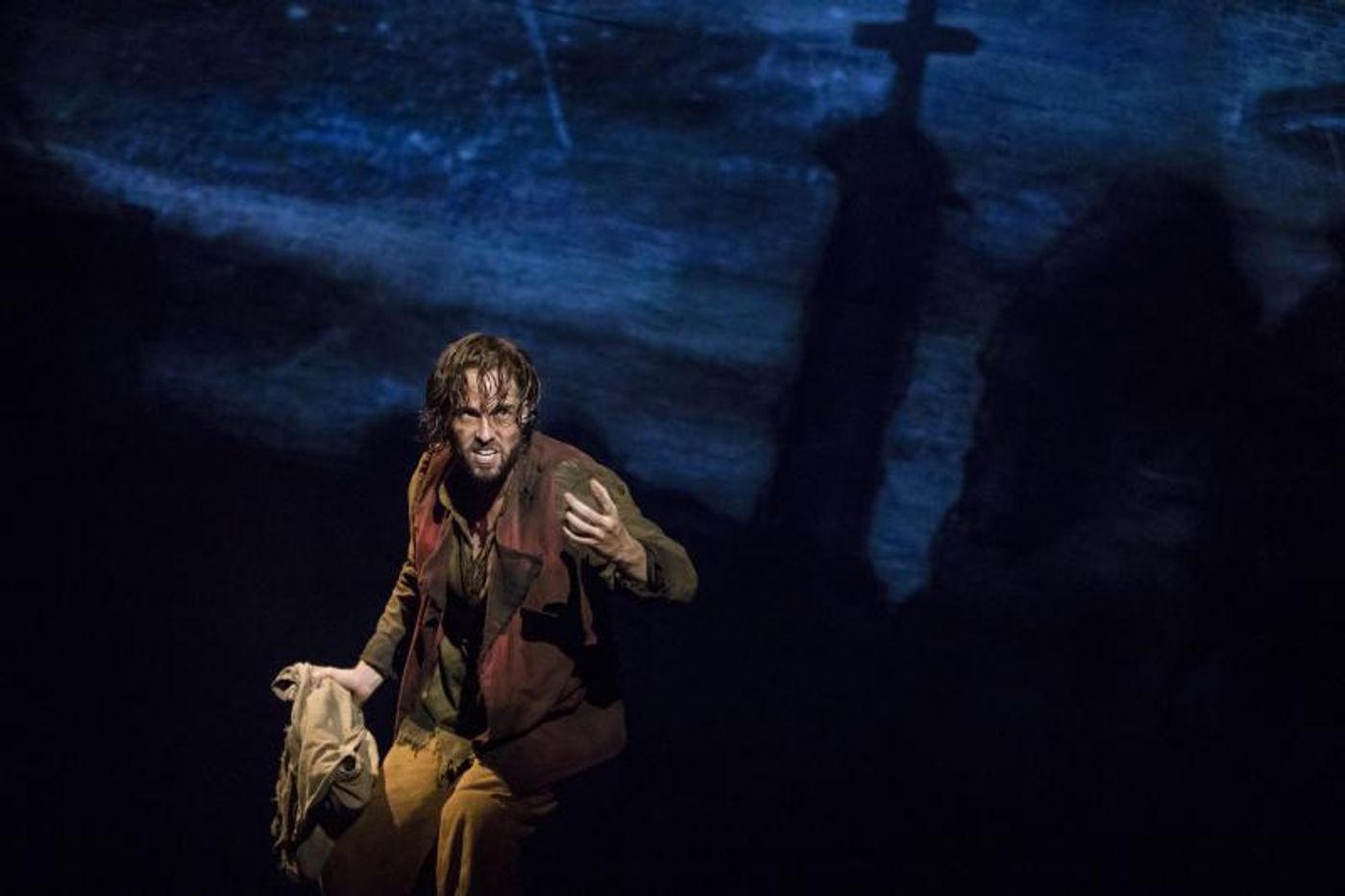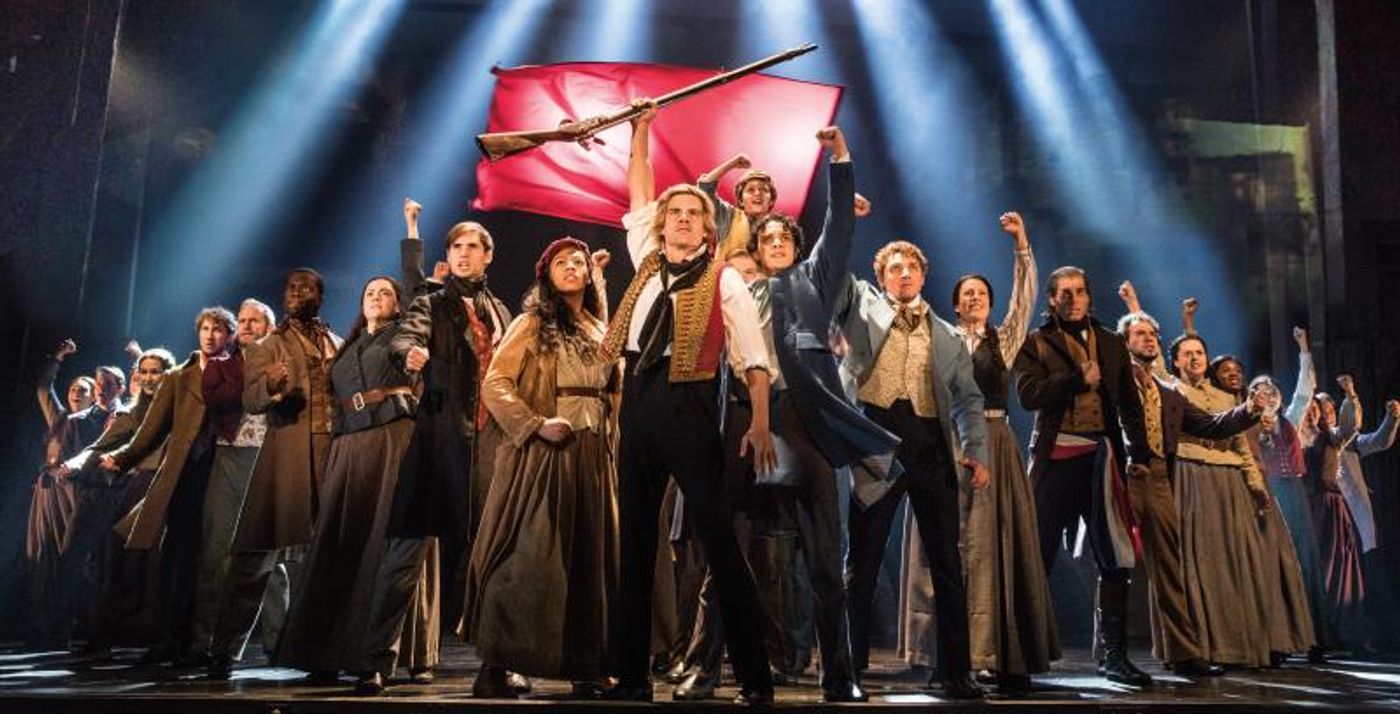Review: LES MISERABLES at the Hobby Center for Performing Arts is a Dream (I Dreamed)

No need to bury the lede: this production of LES MISERABLES is the most true-to-Broadway theatrical experience I have ever had outside of the Great White Way. Cameron Mackintosh's subtle updates breathe new life into the classic material, and deliver one of those rarified theatrical moments in which everything comes together as intended - the kind of show where you catch yourself holding your breath, lest you miss a moment.
I was much younger the first time I saw LES MISÉRABLES. I was swept away to 19th-century France, caught up in the grandiose ideals and unwavering determination of the characters. I immediately fell in love with the music and the tragic story and wept throughout the production. I left the theatre feeling grateful to have seen the show, and then, as teenagers often do, immediately returned to my small, safe world of long division (which, for the record, I have *never* used since) and general, assorted meaningless insecurities.
Things have changed a lot since then. Perhaps at the time I wasn't mature enough to understand the depth of the show. Maybe it was that I was fully consumed by the Unimportant at that point in my life. Or it could be that way back then I wasn't drowning in daily news-related fears, overwhelmed with constant worry about our divisive climate and divided country. My younger (carefree? happier?) self would have touted this touring production as a not-to-be-missed, utterly sensational, immersive, deeply melodramatic (but it doesn't matter, you'll love it anyway!) three hours of really good, emotive theatre. All of that is absolutely true. However, my current self had a much more intense experience. As I watched best in class talent perform this nearly sacred piece of art, as I fell deep into the powerful libretto and the beautiful loneliness of the music, I was startled to realize that it wasn't just the humanity of the characters to which I could relate (as anticipated), but I could connect with their actions and circumstances, though first imagined 150+ years ago.
WHAT'S IT ALL ABOUT?
LES MISÉRABLES tells a number of interlocking stories set in 19th-century France, centered on Jean Valjean's lifelong quest for redemption and desire to redefine himself after circumstance led him to crime. That circumstance is poverty - one which he was born into - and the crime was stealing bread for his sister's hungry child. For that, he served 19 years in jail, his identity evolving from a person to a number, inmate #24601.
When granted parole, Valjean is desperate for a home, rejected by his community, and understandingly spiteful. You see, just as the world often does today, he is judged based solely on one action, without any understanding of its impetus, or the opportunity to be viewed as a reformed man who served his time. It seems inevitable that he will return to crime, fueled in part by anger, and as a means to an end.
It is only after a church Bishop welcomes him, shows him the comfort of kindness, and treats him with respect and mercy, that Valjean decides to truly start his life anew, rejects society's classist expectations of a criminal, and pursues an unchartered path toward redemption. Unfortunately, that path is riddled in irony, as it's only achievable by violating his parole. Valjean rejects his number and name, taking on a new identity in order to escape "this world that always hated me," in pursuit of a life rooted in love, trust and the "God above..." all the while on the lam from police inspector Javert.
Gandhi said, "As human beings, our greatness lies not so much in being able to remake the world - that is the myth of the atomic age - as in being able to remake ourselves." Valjean's relatable desire to start a "new story," and overcome his circumstances is deeply embedded in American ideology. And while I do not condone law-breaking, it could be argued that Valjean's "crime," caused by his inability to feed his starving niece through traditional means, didn't warrant nearly two decades of punitive action. But hey, it's a play. However, sitting in the darkened theatre, Texas Congressional candidate - US House of Representatives District 25 - Julie Oliver comes to mind. She recently revealed that "homeless, pregnant, and alone, I had to steal to eat. Mine is a tough story to tell, but it's not mine alone. I have encountered so many people who are just like me." Parallels can also be drawn between Valjean's classist prison sentence, and today's racial disparity of incarcerated non-violent people of color, compared to their Caucasian and often more affluent counterparts.

Eight years pass, and Monsieur Madeleine (Valjean) is a factory owner and respected mayor. He has steadily remained on his righteous path, showing empathy and kindness to all, including one of his factory's employees, Fantine.
Fantine's crime is that of an unwed mother. Though not illegal, Fantine's colleagues demand her dismissal upon learning of her illegitimate daughter Cosette. Without a job, and desperate for funds to send to the money-hungry, comically cruel and crooked Thénardier family for her daughter's care, Fantine sells her jewelry, her hair, and eventually herself in a brothel. She would sooner debase herself than allow her child to go without. I can't help but draw parallels between Fantine's sacrifices for her daughter, and the thousands of detained immigrant children currently held in this very state, brought or sent to America by their parents, who knowingly risk great danger and face monumental sacrifice to give their children a better life.
In Fantine, Monsieur Madeleine recognizes himself. When Fantine is assaulted by a prospective 'customer,' and is nearly arrested by Javert, Monsieur Madeleine demands that she be treated at a hospital, instead of forgotten in jail.
Despite his fancy trappings of wealth and mayoral title, Monsieur Madeleine is soon detected by Javert as Jean Valjean, finally found after a relentless eight-year manhunt.
This kicks off a string of entanglements that cause the characters to question law and order, personal morality, and sacrifice. As time goes on, we find our characters at great unrest, muddling through miserable choices of safety or freedom, patriotism or love, and a perpetual search for redemption, acceptance, and a home of one's own.
So yeah... that's a lot, and I barely scratched the surface of this complicated and searing musical.
FASCINATING HISTORY
LES MISÉRABLES was originally conceived when French songwriter Alain Boublil was watching a revival of OLIVER! in London (which was coincidentally produced by Cameron Mackintosh). "As soon as the Artful Dodger came onstage, Gavroche came to mind. It was like a blow to the solar plexus. I started seeing all the characters of Victor Hugo's [1862] Les Misérables-Valjean, Javert, Gavroche, Cosette, Marius, and Éponine-in my mind's eye, laughing, crying, and singing onstage."
Boubil brought the concept to composer Claude-Michel Schönberg, who immediately quit his job to work full time on the project, and soon engaged poet Jean-Marc Natel (who had never before written lyrics) as co-author. LE MIZ was first performed as an experimental highbrow 'concept album' in 1980, but soon closed as because "not many people in the early 1980s were in the habit of adapting sprawling Victorian French novels into musicals," let alone audiences seeing said novel played out on a stage.
In 1983, approximately six months after Mackintosh had successfully opened CATS on Broadway, he received a copy of the French album LE MIZ from director Peter Farago, who asked him to produce an English-language version of the show. It took some convincing, but Mackintosh eventually agreed, assembling a team including lyricist Herbert Kretzmer and the Royal Shakespeare Company to develop the material for British audiences.
After two years, the English-language version opened in London in 1985. While critics panned the show, audiences fell hard for its emotional turns and tragic characters. The show's box office returns led to a seemingly permanent spot in the West End, and soon thereafter, a series of runs on the Great White Way.
Cut to 2009, now prolific Cameron Mackintosh, named by The New York Times as "the most successful, influential and powerful theatrical producer in the world," revives LES MISÉRABLES in celebration of its 25th Anniversary. We're talking a pretty major overhaul, including new orchestrations by Christopher Jahnke, Stephen Metcalfe and Stephen Brooker, updated staging by Michael Ashcroft and Geoffrey Garratt, lighting by Paul Constable, sound by Mick Potter, costumes by Andreane Neofitou, and Christine Rowland, and set and imagine design by Matt Kinley, all under the direction of Laurence Connor and James Powell. I just listed a whole bunch of awesome - take a moment to google a few of these uber-talented, highly pedigreed artists for yourself. This updated version of LES MISÉRABLES toured the world, returned to Broadway in 2014, and is now playing at the Hobby Center for Performing Arts.
WHY THIS PRODUCTION MATTERS
It's no easy feat to move an intricate Broadway show around the country via truck. It's even harder to sustain the same feeling of intimacy found in New York's small theatre houses, when moved to a performance hall three times the size. And it's nearly impossible to create a musical that still resonates with audiences 38 years after its original debut.
But Producer Mackintosh and Directors Connor and Powell achieved all of that, refusing to compromise Broadway level production values even just a little when taking the show on the road. The result is sublime. This production of LES MISÉRABLES is the most true-to-Broadway theatrical experience I have ever had outside of the Great White Way. This is a rarified moment in which everything comes together as intended, the kind of show where you catch yourself holding your breath, lest you miss a moment.
It would be easy to prioritize singing ability when casting this operatic show. But once again, directors Connor and Powell refused to take the easy way out, and selected absurdly talented singers who could also act and emote, gifted with the ability to move an audience without even saying a word. It's unquestionable that they love LES MIZ, and their passion comes through in every detail, from the seamless transitions between scenes, their specific use of silence to call the audience to attention, and even to their polite nod to audience members by starting the lengthy show exactly on time.
The 50+ person cast showed up and showed out. They came to do their job, and they did it to perfection. Each company member is individually skilled, but it's their collective voices - the organized chaos of joyful noise - during showstoppers "One Day More" and the "Finale" that leave audiences exhilarated. There are specific standout roles, but by and large this is an ensemble production, mighty because its players listen to each other, engage with each other, and clearly love the work... just like a finely tuned Broadway production.
As Jean Valjean, Nick Cartell's character experiences the most growth, both in time and in mind. Cartell is aided by a mighty costume department and theatrical makeup, but it was his own physicality that made his evolution from convict to mayor to father to fighter, and on, feel true. And good grief - his voice. His VOICE! Cartell has a Mariah Carey range and the soul of Lin-Manuel Miranda. He sings and acts with great intention, a real marvel to behold. Friends, remember the name Nick Cartell, you'll definitely hear it again.
At the performance I attended, the role of Fantine was played by ensemble member and understudy Talia Simone Robinson. It should be noted that the role of an understudy is that of a hero. Instead of one role, they must master many, and be ready to take on a role with next to no notice. Fantine is a complicated, layered character, and Robinson did not hold back. She played Fantine as a woman who has humbly accepted her lot in life, while still exuding quiet confidence and self-respect in her refusal to internalize the judgement of others. She flashed glimmers of fury and feminism as she rightfully defended herself from assault, while also conveying deep understanding of the laws of the land and the impact of her actions, no matter how unfair. Robinson's Fantine never bordered into victim, and was the most pure character on the stage - only motivated by love, and unafraid of her vulnerability.
No one said that the path to redemption is easy - it's safe to assert that LES MIZ is an inspirational tragedy. Luckily, this production was gifted with the presence of Allison Guinn and J. Anthony Crane as Madame and Monsieur Thénardier. Despite their character's dastardly deeds, it's impossible not to love them, and appreciate their place as much needed comic relief. Guinn and Crane are skilled physical actors, who use every tool in their shed of great talents to break up the tragedy with moments of lightness. After all, you can only cry so much without brief reprieve.


On the opposite end of the spectrum stands Éponine Thénardier, played by Paige Smallwood. As crass, cruel and selfish as her parents are (and raised her to be), Smallwood's Éponine is soft, loving and caring. Her struggle for unrequited love - though seemingly preposterous - is relatable, and when she sings, her voice quivers - actually quivers - without any smacking of insincerity.
I was particularly delighted that both the role of Éponine and Fantine were played by women of color. I hope that future castings include even more diversity, in order to connect this classic show with modern audiences.
The lighting and set design was another direct-from-Broadway standout. Inspired by Hugo's own art, Kinley's backdrops, projected by Fifty-Nine Productions, move the audience from time and place, without an overabundance of literal markers. They are often dark landscapes, slightly abstract, moody, and always compliment - not compete - with the content. Midway through the first act, I realized that we had moved through no less than 10 individual scenes, each appropriate, highly detailed, often beautiful and intricate, and best of all - without any distraction. Constable's lighting design, coupled with Kinley's imagery and sets, achieves next level greatness. His strategic use of shadows and darkness is elegant, refined, and emotive, without aggressively telling the audience 'this is how you should feel right now.'
Despite very real (and depressing) comparisons between the plot and current events, I could describe LES MIZ as melodramatic, farfetched, predictable and self-indulgent. Sure, all of that is true, but I just don't care. This is a show created for audiences and sustained for nearly four decades by audiences because it is grandiose and angsty and emotionally manipulative. That's part of what makes it fun to watch.
LES MISÉRABLES has earned a whopping eight Tony Awards, three Laurence Olivier Awards, a Grammy, and five Drama Desk Awards (among others) since its Parisian premiere 38 years ago. LE MIZ has sold more than 70 million tickets in 44 countries, and currently holds the title as the fifth longest running musical on Broadway, and the longest running musical in the West End.
LE MIZ is a show for everyone, packed with nonstop action, relatable archetypes, and just enough theatrical magic to keep audiences rapt throughout its three hour runtime. Prior to this viewing, the show was known in my household as "the really, really sad one." I'm pretty sure that here on out, it'll be known as the "really, really real one." But you don't have to see the show through my gaze to enjoy your experience. Allow yourself the freedom to get lost in the music, laugh loudly, cry endlessly. For the story of LES MISÉRABLES - though deeply tragic - is ultimately about redemption, the strength of the human spirit to conquer grief, and the courage to overcome even the most wretched circumstances, one day more.

Mischer Neurosciences Broadway at the Hobby Center presents LES MISÉRABLES, running now through September 30. Tickets start at $35. For additional information and to purchase tickets, please visit thehobbycenter.org.
Reader Reviews
Videos

